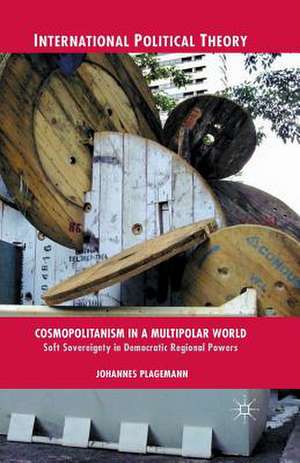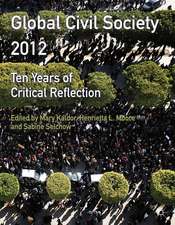Cosmopolitanism in a Multipolar World: Soft Sovereignty in Democratic Regional Powers: International Political Theory
Autor J. Plagemannen Limba Engleză Paperback – 2015
| Toate formatele și edițiile | Preț | Express |
|---|---|---|
| Paperback (1) | 385.84 lei 6-8 săpt. | |
| Palgrave Macmillan UK – 2015 | 385.84 lei 6-8 săpt. | |
| Hardback (1) | 391.99 lei 6-8 săpt. | |
| Palgrave Macmillan UK – 28 mai 2015 | 391.99 lei 6-8 săpt. |
Din seria International Political Theory
- 18%
 Preț: 1231.47 lei
Preț: 1231.47 lei -
 Preț: 357.89 lei
Preț: 357.89 lei - 15%
 Preț: 636.45 lei
Preț: 636.45 lei -
 Preț: 158.77 lei
Preț: 158.77 lei -
 Preț: 358.18 lei
Preț: 358.18 lei - 9%
 Preț: 737.58 lei
Preț: 737.58 lei -
 Preț: 382.95 lei
Preț: 382.95 lei - 15%
 Preț: 466.31 lei
Preț: 466.31 lei - 15%
 Preț: 643.00 lei
Preț: 643.00 lei -
 Preț: 213.97 lei
Preț: 213.97 lei - 15%
 Preț: 641.03 lei
Preț: 641.03 lei -
 Preț: 385.84 lei
Preț: 385.84 lei -
 Preț: 394.87 lei
Preț: 394.87 lei - 18%
 Preț: 890.37 lei
Preț: 890.37 lei - 15%
 Preț: 634.14 lei
Preț: 634.14 lei - 15%
 Preț: 635.15 lei
Preț: 635.15 lei - 18%
 Preț: 727.00 lei
Preț: 727.00 lei -
 Preț: 388.72 lei
Preț: 388.72 lei - 15%
 Preț: 642.51 lei
Preț: 642.51 lei - 18%
 Preț: 729.36 lei
Preț: 729.36 lei - 15%
 Preț: 639.08 lei
Preț: 639.08 lei -
 Preț: 391.61 lei
Preț: 391.61 lei -
 Preț: 394.51 lei
Preț: 394.51 lei -
 Preț: 383.93 lei
Preț: 383.93 lei -
 Preț: 389.70 lei
Preț: 389.70 lei - 18%
 Preț: 736.50 lei
Preț: 736.50 lei -
 Preț: 385.62 lei
Preț: 385.62 lei -
 Preț: 388.52 lei
Preț: 388.52 lei -
 Preț: 392.60 lei
Preț: 392.60 lei -
 Preț: 384.86 lei
Preț: 384.86 lei - 15%
 Preț: 638.89 lei
Preț: 638.89 lei -
 Preț: 390.63 lei
Preț: 390.63 lei
Preț: 385.84 lei
Nou
Puncte Express: 579
Preț estimativ în valută:
73.84€ • 76.81$ • 60.96£
73.84€ • 76.81$ • 60.96£
Carte tipărită la comandă
Livrare economică 15-29 aprilie
Preluare comenzi: 021 569.72.76
Specificații
ISBN-13: 9781349504008
ISBN-10: 1349504009
Pagini: 294
Ilustrații: XIII, 294 p.
Dimensiuni: 140 x 216 x 17 mm
Greutate: 0.36 kg
Ediția:1st ed. 2015
Editura: Palgrave Macmillan UK
Colecția Palgrave Macmillan
Seria International Political Theory
Locul publicării:London, United Kingdom
ISBN-10: 1349504009
Pagini: 294
Ilustrații: XIII, 294 p.
Dimensiuni: 140 x 216 x 17 mm
Greutate: 0.36 kg
Ediția:1st ed. 2015
Editura: Palgrave Macmillan UK
Colecția Palgrave Macmillan
Seria International Political Theory
Locul publicării:London, United Kingdom
Cuprins
Acknowledgements Glossary Of Acronyms Introduction PART I: COSMOPOLITANISM, SOVEREIGNTY AND MULTIPOLARITY 1.1 Regional and Rising Powers in International Political Theory 1.2 Cosmopolitanism 1.3 Cosmopolitan Sovereignty and Practice Dependency PART II: THE TRANSFORMATION OF SOVEREIGNTY 2.1 Sovereignty on the Subnational Level 2.2 Sovereignty on the Transnational Level 2.3 Sovereignty on the Supranational Level PART III: THE TRANSFORMATION OF SOVEREIGNTY IN BRAZIL 3.1 Subnational Level 3.2 Transnational Level 3.2.1 A New Institutional Layer? 3.2.2 Disillusionment and Consolidation 3.3 Supranational Level 3.3.1 Foreign Policy Thinking under Cardoso and Lula da Silva 3.3.2 Regional Integration 3.4 Brazil: Conclusion PART IV: THE TRANSFORMATION OF SOVEREIGNTY IN INDIA 4.1 Subnational Level 4.2 Transnational Level 4.2.1 Participatory Experiments 4.2.2 Changing Forms of Protest 4.3 Supranational Level 4.3.1 India's Foreign Policy Thinking and National Sovereignty 4.3.2 Regional Integration 4.4 India: Conclusion PART V: THE TRANSFORMATION OF SOVEREIGNTY IN SOUTH AFRICA 5.1 Subnational Level 5.2 Transnational Level 5.2.1 Forms of Engagement: Winners and Losers 5.2.2 Professionalism and Constituency Building in a Context of Fluidity 5.3 Supranational Level 5.3.1 South African Foreign Policy Thinking 5.3.2 Regional Integration 5.4 South Africa: Conclusion PART VI: SOFT SOVEREIGNTY AND FACT-SENSITIVE COSMOPOLITANISM 6.1 Soft Sovereignty And Complex Multipolarity 6.2 Complex Multipolarity and Cosmopolitanism 6.3 A Moderate, Plural, and Embedded Cosmopolitanism for a Complex and Multipolar World Conclusion Bibliography Appendix
Recenzii
'Cosmopolitanism in a Multipolar World is a shining example of the type of bridge-building work that the literature desperately needs. Plagemann succeeds in bridging the gaps between the champions of national sovereignty and those who herald a full-blown cosmopolitan order, and between the empirically-inclined study of regional powers and the normatively-focused analysis of what a just global order should look like. Central to his project is the notion of soft sovereignty, the bounded exercise of rightful authority, and he shows how this notion can be fruitfully used to reveal aspects of the foreign and domestic behaviour of emerging powers such as Brazil, India, and South Africa that otherwise would be left unexplored. Most stimulating, though, is how he uses this notion to modify and moderate cosmopolitanism itself. He argues that the empirical analysis of soft sovereignty in practice reminds us of power asymmetries in the world and of the fundamentally moral role that the honouring of national (and sub-national) communities and national development goals can play in mitigating these asymmetries. This is a very fine and detailed piece of work and it deserves to be widely read and discussed.' Philip Nel, Professor of Politics, University of Otago, New Zealand
'Cosmopolitanism in a Multipolar World is an extremely sophisticated assessment of regional powers from a cosmopolitan point of view. It carves out the cosmopolitan potential in Brazil, India and South Africa. Soft sovereignty is an apt term to capture the ambiguities and intricacies of the political thinking in these rising democracies.' Dr. Michael Zürn, Director, Global Governance, Wissenschaftszentrum Berlin, Germany
'This is a remarkably original book, which stands out in its ambitious attempt to bridge the long-standing and unhelpful divide between Political Theory and Comparative Area Studies. Offering great value-added to the reader in its sophisticated theorising and rich empirical detail, it develops an insightful analysis of the evolving concept of sovereignty in a world undergoing major power transitions.' Professor Amrita Narlikar, President, German Institute of Global and Area Studies
'Cosmopolitanism in a Multipolar World is an extremely sophisticated assessment of regional powers from a cosmopolitan point of view. It carves out the cosmopolitan potential in Brazil, India and South Africa. Soft sovereignty is an apt term to capture the ambiguities and intricacies of the political thinking in these rising democracies.' Dr. Michael Zürn, Director, Global Governance, Wissenschaftszentrum Berlin, Germany
'This is a remarkably original book, which stands out in its ambitious attempt to bridge the long-standing and unhelpful divide between Political Theory and Comparative Area Studies. Offering great value-added to the reader in its sophisticated theorising and rich empirical detail, it develops an insightful analysis of the evolving concept of sovereignty in a world undergoing major power transitions.' Professor Amrita Narlikar, President, German Institute of Global and Area Studies
Notă biografică
Dr. Johannes Plagemann is research fellow at the GIGA Institute of Asian Studies in Hamburg, Germany. He was a post-doctoral member of the Sofja-Kovaleskaja research group on 'Background Justice between States: Global Institutional Design to Foster Sovereign Statehood' at the Technical University Darmstadt (2014) and research fellow at the GIGA Institute of African Affairs (2010-2014). He teaches at the University of Hamburg and publishes in scholarly journals such as Globalizations and Global Justice: Theory Practice Rhetoric. Johannes Plagemann studied Philosophy and Economics in Bayreuth and Sao Paulo (BA) and Political Sciences in Hamburg and Bordeaux (MA). He did fieldwork in Mozambique, Brazil, South Africa, and India.












